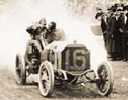Russell's Ramblings
by Russell Jaslow
Will Buxton Got It All Wrong
3/28/13
Rochester, N.Y.—Will Buxton, the superb, enthusiastic on scene analysis for Formula 1 TV coverage in America the past few years wrote an excellent piece on the Malaysian Grand Prix controversy concerning the Red Bull drivers, specifically Sebastian Vettel.
First, Buxton did the smart thing, waiting a few days before putting his thoughts down. No knee jerk reaction, but time to take it all in and let his mind percolate all the information. Second, Buxton achieved the rare duality on the Internet -- a well written argument followed by sane, constructive comments by readers. There were so many comments, I never had time to read them all. Usually, after about a dozen or so comments, an Internet discussion degrades into a kindergarten free for all. Not this time.
However, despite all this, Buxton got it all wrong.
Before I start, I must lay out my points of view on certain topics:
- I don't like team orders. I always felt CART/Champ Car/Indycar, whatever it has been called over the years, has always had an advantage over F1 when it came to this. Team owners allow drivers in America to fight it out. The only rule is don't knock your teammate out. The concept of a number one and two driver in America doesn't exist. Yes, as the season winds down and a championship is on the line for one of your drivers, by all means, team orders make sense. But, not as a rule of operation.
- I loved the battle between Vettel and Mark Webber for the lead in Malaysia. What racing fan wouldn't? It was thrilling, heart stopping, ballsy racing. Exactly what we expect from the top drivers in the world. That's what racing should be, and F1 needs to stop stifling it.
- I find it interesting that the drivers championship existed eight years before the constructors championship, yet within the teams it's the constructors championship which almost always takes precedence over the drivers. Part of this is the attitude of the teams and the fact they all design and build their own cars. Lately, a lot of it is the way F1 and the Concorde Agreement is set up.
When Bernie Ecclestone railed on team orders, I found it very hypocritical. (Then again, does Bernie ever say something which is not hypocritical?) According to the Concorde Agreement, the teams are paid based on constructor points. Those points are worth millions and millions of dollars. With this system, of course the teams are going to favor those points over the driver points. Of course the teams are going to favor the team needs over the driver needs. Of course the teams are going to want to stifle competition as much as possible in order to preserve those precious constructor points. What do F1, the FIA, and Bernie expect?
Now that we got those points out of the way, let's get back to the Malaysian doings and Buxton's piece.
I'm reminded of a recent National Hockey League game I watched between the New York Rangers and the Philadelphia Flyers. During a scrum in front of the net, the Rangers Ryan Callahan and the Flyers Max Talbot decided to go at each other. The gloves were dropped, Talbot grabbed Callahan's arm, yanking him down to the ice. However, the yanking of Callahan's arm caused an injury, and Callahan laid down in pain. Talbot noticed this, and immediately stopped fighting.
According to Buxton's logic, Talbot can never possibly be a champion because he is not "cold, calculated, ruthless." He goes on to say, "Is this not the attitude that all the greats possess? To take advantage of every opportunity they see?"
Talbot knew that taking advantage of every opportunity does not necessarily mean doing so on an unfair playing field. Talbot could have pounded Callahan into submission, possibly giving his team a surge of adrenalin to carry throughout the rest of the game. But, he did not.
Yes, I know all the sports cliché lines -- "Good guys finish last," "Show me a good loser and I'll show you a loser," and so on. But, since when does that include beating someone on an uneven playing field?
Buxton mentions Jackie Stewart's criticism of Ayrton Senna and Senna's rebuttal. Was not Stewart a great champion? He still holds one of the highest winning percentages in F1 racing and took three world titles. On the track, Stewart was certainly cold, calculated, and ruthless. But, on an even playing field, the way Stewart wanted it. Stewart didn't need Senna/Schumacher/Vettel tactics to build up one of the greatest careers in racing history. Nor did Fangio, Ascari, Brabham, Hill, Clark, Fittipaldi, etc.
Buxton uses the analogy of boxers fighting till the bell rings. The problem is, Buxton used the wrong analogy. The proper analogy would be if the ref had to temporarily halt the fight before the bell and orders the boxers to their corners. One boxer follows this order while the other one punches his opponent in the back of the head.
This is what Vettel did. Webber followed the order of the "ref" (in this case his boss) and stopped fighting. Vettel ignored that order and sucker punched Webber in the back of the head. That sucker punch caused Webber too much harm to recover from.
Is this what Buxton calls competition? Is this what Buxton claims a champion should do? Wait till the playing field is uneven and then kick your opponent, who's looking the other way, in the balls?
I'm also reminded of a story Bobby Unser relayed about a race against A.J. Foyt. Talk about two cold, calculated, ruthless champions. Foyt's philosophy was "It ain't cheating if you're not caught." Unser was the master at fooling the yellow light system at Indy to his advantage.
Yet, in this particular USAC stock car race, Unser went to pass Foyt, but started losing control of his car. Unser was going to spin out and most likely crash heavily. Foyt noticed this, and tapped Unser just right, enabling Unser to regain control of his car and continue on. The tap caused Foyt to lose momentum, enabling Unser to pass him. However, Unser immediately backed off and let Foyt back in front. Then, the two of them once again fought tooth and nail for the win.
They both understood the rule of the playground. You fight as hard as you can on an even playing field. You stop the fight when that field is no longer even because a win in that situation is meaningless. You resume the fight when the field becomes even again.
Buxton doesn't seem to think so. According to Buxton's logic, his hero must be Lance Armstrong. His favorite baseball player must be Sammy Sosa with his corked bats. He would call Max Talbot a wussy.
Anyone who has competed knows the joys of crushing your opponent. There's nothing wrong with this attitude. Ask a chess player what their most pleasurable moment is in a match. They will always say it is the moment they see their opponent squirm in their seat, the moment you have him beat. But, just because you get a euphoric feeling out of that pleasure doesn't mean you distract your opponent and swipe the queen off the board and then insist he has to continue with this uneven playing field.
That's what Vettel did. He swiped the queen off a distracted Webber's board. He waited till the ref told them to halt fighting, and sucker punched Webber in the back of the head. He broke every rule in the playground, hitting the kid with the glasses in the face.
It was an uneven playing field, and champions -- real champions -- know at that moment the fight is over. That's why Buxton got it all wrong. And to praise Vettel, is nothing more than praising the schoolyard bully or the neighborhood thug.
Cold, calculated, ruthless has nothing to do with it. Cowardice does.
Copyright © 2013 by and Deep Throttle. All Rights Reserved.
Russell's Ramblings Archive
|




